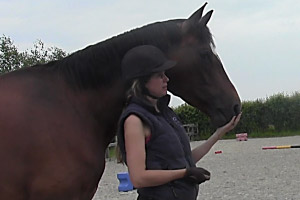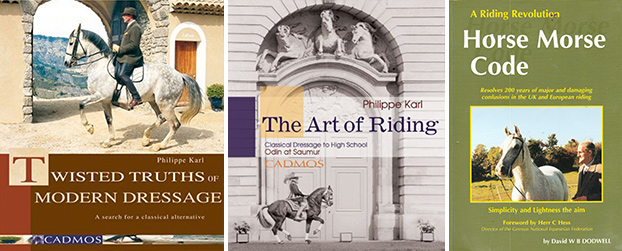Kat trains her horses using a classical system that is based on clear, consistent aids that do not work in opposition, that the horse can clearly understand and can carry out without compromising its biomechanical integrity and classical posture. This produces a horse in true self carriage, in a classical frame and one that is motivated and relaxed in its work. Kat’s approach works with the horse, not against it and addresses the root cause of resistance; it doesn’t mask the symptoms. The horse’s mouth is respected completely and Kat does not use any equipment that restricts the horse’s ability to express how its mouth is feeling or force it into an un-natural frame. She is able to show her clients how it is possible to develop a dressage horse without the use of severe bits, flash/drop nosebands, side-reins or gadgets. Kat’s system starts with in-hand ground work and continental lunging. These work together to educate horse and rider on what the aids mean and how and when to apply them and to address asymmetry issues in horse and rider and begin to improve straightness. This then continues onto training from the saddle, following the same principles, alongside the development of in-hand lateral work, continental lunging and gymnastic jumping, both on the lunge and under saddle.
In the following Kat explains how her knowledge on classical equitation developed
In 1997 I was searching for a compassionate dressage trainer who followed the principles of classical dressage theory and who was committed to using training methods that had a positive impact on the physiological and psychological welfare of the horses they trained. I was fortunate to find David Dodwell, a Classical Grand Prix dressage rider who had developed a kind, effective and respectful system of training horses, I was lucky enough to train with this modern day past master for 12 years.
Under David’s guidance, I rode and trained his, my own and clients horses in classical dressage from Prelim to Grand Prix, including all lateral work and the more advanced movements of Pirouette, Piaffe, Passage, Spanish Walk. They were all ‘normal’ horses but trained using his system were the lightest, most active, motivated, responsive horses I’d ever ridden. In 1997 there was almost no scientifically published research on how different training systems related to equine learning theory (how horses learn and understand) and David's meticulous development of a concise, consistent system lent itself perfectly to this area of study. With David's full support I based my Equine Science Degree’s behavioural thesis on this topic which involved 18 months of in-depth study. When it was finished I was awarded a ‘First class’ for it and was invited as a guest speaker to present the results of the study at the Equine Behaviour Forum’s 25th Birthday Scientific Symposium at De Montfort University in 1999.
My last lesson with David was in 2009 and sadly David passed away in 2010, aged 84. Towards the end of his life, he talked about the teachings of the French Classical Riding Master Philippe Karl and how there were many links between their systems. David Dodwell and Philippe Karl both developed systems of training that put the welfare of the horse as the top priority, both systems have their foundations in the teachings of the great past masters and both men were and are highly critical of the abuse endured by many horses trained using modern competitive dressage training techniques.
Philippe Karl was an Ecuyer at the Cadre Noir in Saumur for 13 years. After leaving the Carde Noir, Philippe Karl created the ‘School of Légèreté’ (French for lightness) in order to pass on his philosophy of training horses with lightness and respect. In 2011 I learned that Philippe Karl was planning to run his ‘School of Légèreté’ teacher training course in the UK, the first time he had taught in the UK. I was fortunate enough to begin studying his methods directly with him by embarking as an Auditor following the progress of the first eight UK instructors on their three year UK teacher training course. In 2014 Philippe Karl hand-picked another eight UK professional instructors to join the ‘School of Légèreté’ as training instructors on the second UK course. After a very vigorous selection process I was very fortunate to be one of the eight instructors selected and I am currently completing the 3-year instructor's course, training with Philippe Karl in person.
For more information about Philippe Karl, his books, DVDs and the School of Légèreté instructor's list, visit his website www.philippe-karl.com
For more information about David Dodwell, his system and his book ‘A Riding Revolution - The Horse Morse Code’, visit the ‘The Horse Morse Code’ link on the Homepage. This link is an article Kat wrote about David that was published in Tracking-Up magazine in the Winter of 2011.
For more information on Kat’s Dissertation study on equine learning theory in relation to training the riding horse, visit the ‘Equine Learning Theory’ link on the homepage. This is a scanned copy of Kat’s dissertation project which was awarded a ‘First class’ and was shortlisted for the 1999 Equvalan Thesis of the Year award.





















